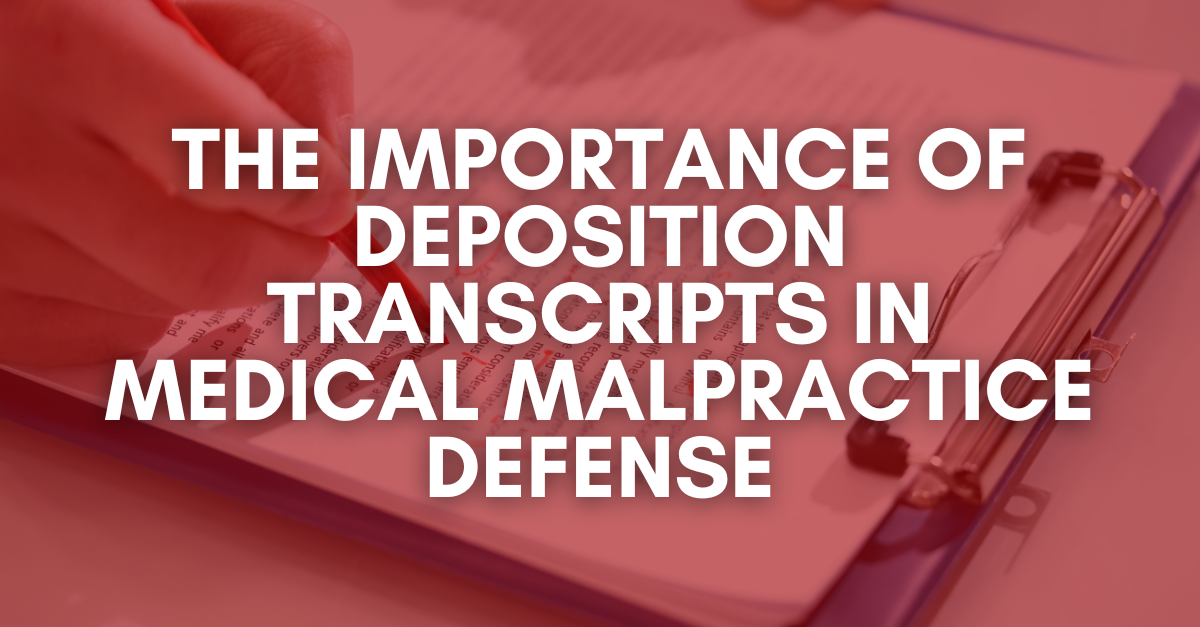Medical malpractice cases can be complex and daunting for defense attorneys and the insurance companies that support them. One of the most critical tools in building a strong defense is the deposition transcript. These transcripts provide a detailed record of the testimony given by all parties involved, offering valuable insights that can be pivotal in challenging the credibility of plaintiff claims. Here, we delve into why deposition transcripts are so vital in medical malpractice defense and how they can be effectively utilized.
Understanding Deposition Transcripts
A deposition transcript is a written record of the oral testimony given under oath during a deposition. Depositions are a part of the discovery process, where attorneys gather information before a trial. These transcripts capture every question asked and every answer given, providing a comprehensive account of the witness’s statements.

Key Benefits of Deposition Transcripts
- Identifying Inconsistencies: One of the primary uses of deposition transcripts is to identify inconsistencies in the plaintiff’s testimony. By comparing the deposition transcript with other statements and evidence, defense attorneys can pinpoint contradictions that may undermine the plaintiff’s credibility.
- Exposing Exaggerations: In medical malpractice cases, plaintiffs may exaggerate their symptoms or the impact of the alleged malpractice. Deposition transcripts allow defense attorneys to scrutinize these claims closely. Any discrepancies between the deposition and other medical records or testimonies can be used to challenge the plaintiff’s assertions.
- Challenging Expert Witnesses: Expert witnesses often play a crucial role in medical malpractice cases. Deposition transcripts of these experts provide a detailed account of their methodologies, conclusions, and potential biases. Defense attorneys can use this information to question the validity of the expert’s testimony and highlight any conflicts of interest or lack of impartiality.
- Preparing for Trial: Deposition transcripts are invaluable in preparing for trial. They help defense attorneys anticipate the arguments and strategies of the opposing side. By thoroughly reviewing these transcripts, attorneys can develop effective cross-examination questions and identify key points to focus on during the trial.
- Supporting Summary Judgment Motions: In some cases, the information gathered from deposition transcripts can be so compelling that it supports a motion for summary judgment. This can result in the case being resolved in favor of the defense without the need for a lengthy and costly trial.

Strategic Use of Deposition Transcripts
To maximize the benefits of deposition transcripts, defense attorneys should employ a strategic approach:
- Thorough Analysis: Conduct a meticulous review of the deposition transcripts to identify inconsistencies, exaggerations, and potential biases.
- Cross-Referencing: Compare the deposition transcripts with other evidence, such as medical records, expert reports, and previous testimonies, to uncover contradictions.
- Expert Consultation: Engage medical experts to analyze the deposition transcripts and provide insights into the validity of the claims and the methodologies used by plaintiff experts.
- Mock Trials: Use deposition transcripts in mock trials to simulate the plaintiff’s arguments and prepare effective counterarguments.
Conclusion
Deposition transcripts are a cornerstone of medical malpractice defense. They offer a wealth of information that can be leveraged to challenge the credibility of the plaintiff’s claims, expose exaggerations, and discredit expert witnesses. By employing a strategic approach to analyzing and utilizing these transcripts, defense attorneys and insurance companies can significantly strengthen their cases and increase the likelihood of a favorable outcome.









